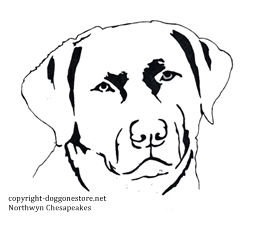|
PUPPY
VAGINITIS
Article written by Mary
C. Wakeman, D.V.M. ©3/17/05 for BREEDERVET
Ashford Animal Clinic Canine Fertility Center 860-429-2110
|
Puppy
bitches often suffer from a cluster of symptoms including cystitis,
vaginal inflammation, vaginal discharge and sometimes urine scalding and
dermatitis of the skin around the vulva.. Most of the time, this
condition is treated with antibiotics only. Frequently, the vet goes
through several different antibiotics with poor results. Many times an
“inverted vulva” and vulvar conformation are blamed for the
condition. Sometimes vulva surgery is advised.
In our experience, “puppy vaginitis” is usually caused by crystals
in the urine. Many puppies have crystals in their urine. Usually these
disappear as the dog grows up, and do not mean that the adult dog will
have crystals. It is very important that young puppies have unrestricted
access to water at all times. If the “puppy vaginitis” is in fact
caused by crystals in the urine, treatment by antibiotics is neither
sufficient by itself nor an appropriate first medication. If the
crystals are not addressed, the problem won’t be cleared up. The
chronic administration of antibiotics without getting to the root cause
of the problem does over the course of the puppy’s first year, finally
result in a highly resistant bacterial population in the vagina.
Urinalysis may not always reveal the presence of the crystals. Because
of the extremely irritated bladder and urethra (and vagina), the urine
stream causes pain and is cut off quickly. Then the bitch tries again
with a similar result, giving the typical sign of cystitis -- small
frequent urinations. Inside the urinary bladder the crystals, being
heavy, settle down to the bottom of the bladder. With the frequent
painful urinations, the lower portion of the bladder often remains full
of urine and crystal sediment that never fully empties out. The first
morning urination is most likely to show us these crystals.
Cystitis always follows an ongoing harmful spiral. Insufficient water
intake concentrates the urine, resulting in crystals precipitating out
in the bladder. With urine stasis and incomplete emptying of the
bladder, Bacteria multiply and change the pH (acid/base condition) of
the urine, causing more crystals to precipitate out. The crystals
irritate the bladder and urethra, causing the urine flow to be cut off
quickly due to pain, and urine to remain in the lower portion of the
bladder. Stagnant urine promotes more bacteria, changing the pH further,
precipitating more crystals, and on and on. Cystitis is treated by a
food additive or special diet food that corrects the pH of the urine,
thereby working to dissolve the accumulated crystals. Then antibiotics
stop the effects of bacteria on the pH, which decreases the amount of
new crystal precipitation in the bladder. Forcing fluids is the simplest
and most basic of all means of decreasing crystals, by diluting the
urine. All of these measures are necessary to treat “puppy vaginitis”
with urinary crystals as the basic cause. NOTE: feeding vegetables has a detrimental effect on
urine pH .
The so called inverted vulva is usually not a problem. Yes,
zillions of bitches have a vulva that is surrounded by a fold of skin.
Very seldom is this condition a problem unless basic hygiene is ignored
by the owner. If your puppy is exhibiting signs of cystitis or vaginitis,
and the area of skin around the vulva and vulvar fold is irritated, pay
attention to the situation and clean inside this fold of skin. It is
dead simple to do this – just pull on the hair of the vulva to bring
it down and straighten out the fold. Then gently wash, rinse and dry the
area, and apply a coating of bag balm or Desitin on the skin of the
vulva and in and around the fold, to prevent further urine scalding. Way
easier than surgery!!! Of the zillions of bitches with this conformation
of the vulva, 99.9% have no problem. It is hygiene, not the conformation
itself, that is responsible for the irritation and skin inflammation.
This stuff is not rocket science. The most important thing in treating
“puppy vaginitis” is to determine, definitively, whether or not
urinary crystals are responsible for the irritation and secondary
infection in the bladder, the vagina and peri-vulvar structures. To
definitively determine whether or not crystals are present, it may be
necessary to pool several urine catches, obtain the first urine of the
day, and do repeat urinalyses.
We routinely check the hair of the vulva and prepuce of 6 to 8 week old
puppies for a ‘sticky’ feel. Sometimes we just remove this
accumulation from the hair and dissolve it in a drop of water on a slide
to see the presence of urinary crystals! Since we routinely observe for
crystals, we are in a position to make sure the puppies’ fluid intake
is maximized, avoiding the later development of the cystitis/vaginitis
condition. Breeders must make sure puppy buyers understand the
importance of 24 hour a day, 7 day a week unrestricted access to water
by the puppy. Often new puppy owners think that withholding water when
they aren’t home in the daytime, or overnight will make it easier to
house break the puppy! It’s up to us as breeders to make a point of
this in our educational
packets for puppy buyers. Mary C. Wakeman, D.V.M.
Always consult with
your Veterinarian for treatment or before treating your dog with any
medication |
|

